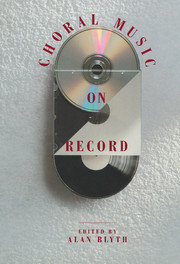Book contents
- Frontmatter
- Contents
- Preface
- Monteverdi: Vespers (1610)
- J.S. Bach: St John Passion
- J.S. Bach: St Matthew Passion
- J.S. Bach: Mass in B Minor
- Handel: Messiah
- Mozart: Requiem Mass
- Haydn: The Creation
- Haydn: The Seasons
- Beethoven: Missa Solemnis
- Mendelssohn: Elijah
- Rossini: Stabat mater Petite messe solennelle
- Berlioz: Grande Messe des Morts Te Deum L'Enfance du Christ
- Verdi: Requiem Mass
- Brahms: A German Requiem
- Fauré: Requiem
- Elgar: The Dream of Gerontius
- Walton: Belshazzar's Feast, Tippett: A Child of Our Time, Britten: War Requiem
- Stravinsky: The Wedding Symphony of Psalms
- Janáček: Glagolitic Mass
- Discographies
- Index
Stravinsky: The Wedding Symphony of Psalms
Published online by Cambridge University Press: 02 December 2009
- Frontmatter
- Contents
- Preface
- Monteverdi: Vespers (1610)
- J.S. Bach: St John Passion
- J.S. Bach: St Matthew Passion
- J.S. Bach: Mass in B Minor
- Handel: Messiah
- Mozart: Requiem Mass
- Haydn: The Creation
- Haydn: The Seasons
- Beethoven: Missa Solemnis
- Mendelssohn: Elijah
- Rossini: Stabat mater Petite messe solennelle
- Berlioz: Grande Messe des Morts Te Deum L'Enfance du Christ
- Verdi: Requiem Mass
- Brahms: A German Requiem
- Fauré: Requiem
- Elgar: The Dream of Gerontius
- Walton: Belshazzar's Feast, Tippett: A Child of Our Time, Britten: War Requiem
- Stravinsky: The Wedding Symphony of Psalms
- Janáček: Glagolitic Mass
- Discographies
- Index
Summary
Both of Stravinsky's largest choral works, Oedipus Rex (1926–7) and Perséphone (1933–4), fall outside the scope of this book, the one because, as an ‘opera-oratorio’, it has already been covered in Opera on Record 2 (Hutchinson, 1983), the other more mundanely because there have been too few recordings to form a basis for comparison. The same reason of neglect disqualifies other pieces, including the great sequence of late choral monuments: the Canticumsacrum (1955), Threni(1957–8), A Sermon, a Narrative and a Prayer (1960–1) and the Requiem Canticles (1965–6), of which the last was one of the few works for large forces that the composer himself did not record. But there is a typicalness too in Oedipus Rex in its straddling of worlds, its being at once a drama, a concert item and a ritual. The Wedding (1914–23), for example, was composed as a ballet of a ceremonial nature, but can work in the concert hall as a ritual cantata. And the more straightforwardly sacred pieces, beginning with the Symphony of Psalms (1930), are liturgies transposed on to the concert platform: apart from small unaccompanied prayers, only the Mass (1944–7) sets a standard liturgical text, and here the accompaniment for ten wind instruments makes concert performance more likely. All Stravinsky's choral works are at once sacred and secular, theatrical and purely musical. So it is entirely suitable that his two most frequently recorded compositions of this kind should be a ballet of wedding songs and a symphony of psalms.
The Wedding (Svadebka; Les noces) had a more protracted genesis than was at all usual for Stravinsky.
- Type
- Chapter
- Information
- Choral Music on Record , pp. 249 - 257Publisher: Cambridge University PressPrint publication year: 1991

